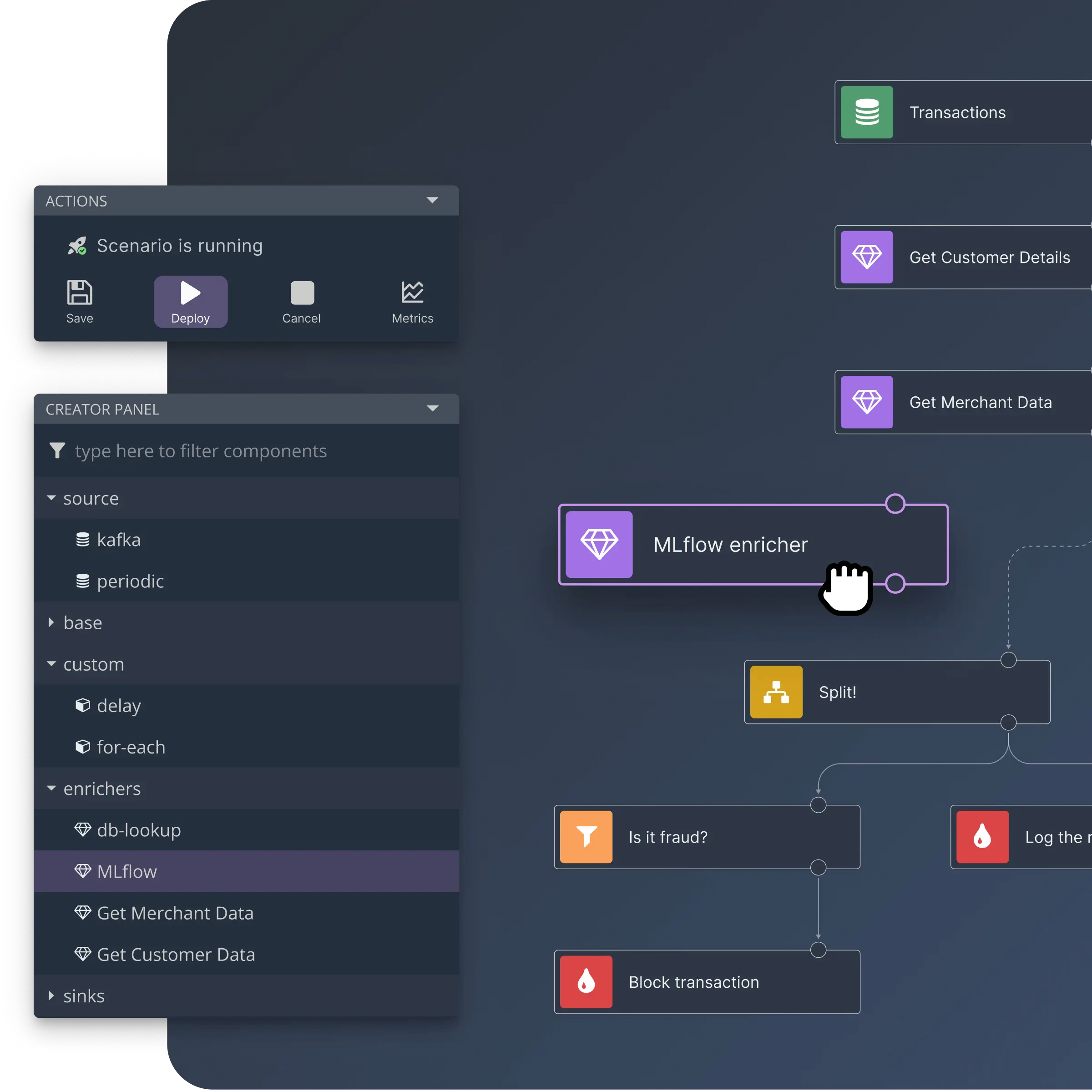Nussknacker vs ksqlDB
Unified Low-Code Data Processing or SQL-based Kafka Querying?
What is ksqlDB?
KsqlDB is an open-source streaming SQL engine tightly integrated with Apache Kafka built on top of Kafka Streams. It facilitates event-driven application development, real-time analytics, and continuous stream processing using a SQL-like language. While powerful in Kafka-specific scenarios, it mainly targets developers comfortable with SQL and Kafka infrastructures.
Read more about ksqlDB
Choose Your Stream Processing Architecture
Base Features of ksqlDB
- streaming SQL: enables real-time querying and data processing using SQL syntax on streaming data,
- real-time materialized views: continuously maintains and updates views from streaming data for fast query responses,
- event-driven architecture: supports the creation of real-time applications based on events, seamlessly integrating with Apache Kafka,
- scalable and distributed: built to scale horizontally across clusters, ensuring high availability and performance,
- joins and aggregations: allows real-time data enrichment by performing joins, aggregations, and transformations on streaming data,
- connectors and integration: provides integration with external systems through Kafka Connect-compatible connectors.
Nussknacker Core Features
- intuitive visual workflow editor: features a user-friendly, drag-and-drop interface enabling business users and analysts to easily design and manage streaming workflows without extensive coding knowledge,
- different processing types: it brings together all data processing methods by enabling streaming, batch, and synchronous (HTTP) workflows,
- stateful computations support: enables windowing, aggregations, joins, and event correlation for advanced stream analytics,
- scalable and performant: utilizes Flink's distributed architecture to achieve horizontal scaling, fault tolerance and high-throughput data processing,
- customization and integration: allows businesses to seamlessly integrate with various databases and other technologies. It also lets us extend Nu’s possibilities with custom Flink operators so they better suit individual needs,
- comprehensive monitoring and debugging: rich built-in tools for seamless workflow management and troubleshooting.

Choose Proper Streaming Solution
While both Nussknacker and ksqlDB focus on stream data processing, they take fundamentally different approaches. Nussknacker emphasizes low-code workflow-based processing, making it accessible for business users, whereas ksqlDB provides a SQL-like interface for real-time data operations. These distinctions shape how they are used and who benefits most from each.
| ksqlDB | Nussknacker | |
|---|---|---|
| User Interface | SQL-based | Visual, intuitive workflow editor |
| Target Users | Geared towards technical users | Suitable for both technical and non-technical users |
| Learning Curve | Medium (requires SQL knowledge) | Low (visual-based approach simplifies adoption) |
| State management | Supports windowing, aggregations and joins | Supports windowing, aggregations and joins |
| Integration Capabilities | Primarily Kafka-centric | Broad and versatile integrations |
| Data Processing | Streaming, synchronous (Pull queries) | Streaming & batch based on Apache Flink, synchronous (HTTP) |
| Extensibility | Custom UDFs | Exposed API for custom components, supports UDFs |
| Reliability | Kafka-based reliability mechanisms | Built on Apache Flink, includes robust checkpointing and fault-tolerance |
Nussknacker or ksqlDB? Making the Right Choice
Nussknacker clearly stands out for organizations aiming to empower business users and analysts, allowing them to design and manage complex event-driven scenarios without needing extensive coding expertise. Its intuitive visual interface, flexibility, and strong extensibility provide significant advantages in rapidly adapting business logic to complex workflows like fraud detection, real time marketing or credit scoring.
ksqlDB is a strong choice for teams deeply embedded in the Kafka ecosystem, offering a SQL-based approach to stream processing. Its focus on SQL means it primarily caters to developers and data engineers, requiring technical expertise to define and manage processing logic. While ksqlDB simplifies querying streaming data, it may not be the most accessible option for business users or teams needing a more intuitive way to manage complex workflows.
It all comes down to who’s going to use the tool and how flexible you need it to be. If you want a user-friendly way to build real-time workflows without deep coding skills, Nussknacker is the way to go—it makes stream processing accessible to both business and technical teams. On the other hand, if your team is already working with Kafka and comfortable with SQL, ksqlDB offers a solid, developer-friendly option. Both have their strengths, but if you’re looking for something that bridges the gap between business and tech while staying flexible, Nussknacker has you covered.
Your Low-Code Platform for Kafka Stream Intelligence
Unlock the full power of Kafka with Nussknacker’s visual, low-code approach to real-time stream processing. Go beyond SQL with complex logic, dynamic workflows, and easy ML integration. Contact us to start building smarter Kafka solutions today.
see the demo in action
compare to FlowFuse
have any questions?